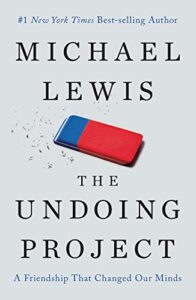Those on this journey of 6 days and a rest, might want to read The Undoing Project: A Friendship That Changed Our Minds, by Michael Lewis. Here is how the book is pitched on Amazon: How a Nobel Prize–winning theory of the mind altered our perception of reality.
 Forty years ago, Israeli psychologists Daniel Kahneman and Amos Tversky wrote a series of breathtakingly original studies undoing our assumptions about the decision-making process. Their papers showed the ways in which the human mind erred, systematically, when forced to make judgments in uncertain situations. Their work created the field of behavioral economics, revolutionized Big Data studies, advanced evidence-based medicine, led to a new approach to government regulation, and made much of Michael Lewis’s own work possible. Kahneman and Tversky are more responsible than anybody for the powerful trend to mistrust human intuition and defer to algorithms.
Forty years ago, Israeli psychologists Daniel Kahneman and Amos Tversky wrote a series of breathtakingly original studies undoing our assumptions about the decision-making process. Their papers showed the ways in which the human mind erred, systematically, when forced to make judgments in uncertain situations. Their work created the field of behavioral economics, revolutionized Big Data studies, advanced evidence-based medicine, led to a new approach to government regulation, and made much of Michael Lewis’s own work possible. Kahneman and Tversky are more responsible than anybody for the powerful trend to mistrust human intuition and defer to algorithms.
The Undoing Project is about a compelling collaboration between two men who have the dimensions of great literary figures. They became heroes in the university and on the battlefield—both had important careers in the Israeli military—and their research was deeply linked to their extraordinary life experiences. Amos Tversky was a brilliant, self-confident warrior and extrovert, the center of rapt attention in any room; Kahneman, a fugitive from the Nazis in his childhood, was an introvert whose questing self-doubt was the seedbed of his ideas. They became one of the greatest partnerships in the history of science, working together so closely that they couldn’t remember whose brain originated which ideas, or who should claim credit. They flipped a coin to decide the lead authorship on the first paper they wrote, and simply alternated thereafter.
This story about the workings of the human mind is explored through the personalities of two fascinating individuals so fundamentally different from each other that they seem unlikely friends or colleagues. In the process, they may well have changed, for good, mankind’s view of its own mind.
Kahneman and Tversky’s work is all about identifying and overcoming cognitive bias. I am very much of the opinion that Genesis One is the original training for mastering our biases. It is difficult to work hard and creatively on Day One and Day Two when all around us things seem to be in chaos. On Day Three when new life sprouts it’s difficult to not jump on the bandwagon of optimism. However those in on the instruction, focus on generosity and prepare ourselves for the new set of standards we know will happen on Day Four. As it was on Day One and Day Two, in Day Four it is difficult to work hard and creatively as this new standard is quietly and lifelessly being set.
The value of properly handing these first four days is seen clearly on Day Five when the mobile biters show up surprising almost everyone with the powerful and also dangerous new life of Day Five. Day Six will be more of the same powerful new life, until a zenith is reached. A wise human at this juncture will ignore the bandwagon of optimism and decide to take a rest rather than worship the works of his hands and attempt to continue to build on Day Seven.
The four main cognitive biases I see being mitigated by Genesis One are Loss Aversion, Anchoring bias, Overconfidence and Bandwagon effect. There are likely others but let me say a bit about each of these four.
Loss Aversion is one of the strongest biases we all face. Tests show repeatedly that humans feel pain or loss at least twice as strongly as they feel pleasure or gain. The Creation Seven encourages us to wade into the chaos and work in Day One and Day Two in spite of the disorder and potential for loss our natural eyes see.
Anchoring Bias is the idea that we expect more of what we most recently experienced. In other words, we expect today to be like yesterday and tomorrow to be like today. The Creation Seven breaks this bias giving us a different exception for today than yesterday and a different expectation for tomorrow as well.
Overconfidence is a bias we all feel when things are going well. We are wise to expect to see some of this on Day Three but having the knowledge of Overconfidence as a bias on Day Six is especially critical. Otherwise the appeal of the 24/7 lifestyle becomes overwhelming.
Bandwagon effect is a well know bias we all participate in, mostly harmlessly, when the sports team in our town is doing well but it is also well known that Bandwagon effect can lead a group or mob to very bad decisions and actions. The interesting thing about Bandwagon effect is it can add to both Loss Aversion and Overconfidence. Making wise and knowledgeable decisions much more difficult. The crowd is not always wrong but at the extremes of either negativity or optimism the crowd is most likely headed for trouble.
Lewis’ Book “The Undoing Project” is a very readable introduction to the work of Kahneman and Tversky on our cognitive biases as human beings. I think it will benefit anyone who needs to make life decisions. Of course, I think their work is best used in conjunction with Genesis One.
